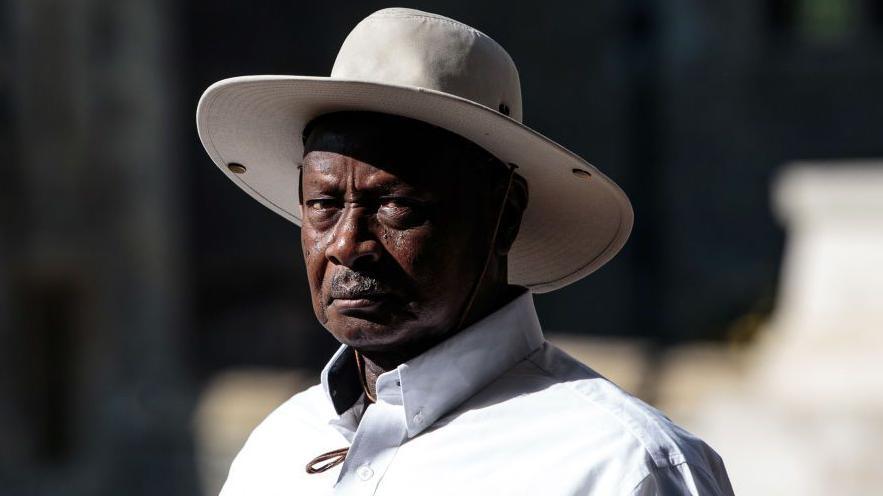Uganda leader backs military trials as rival in jail for Christmas

President Yoweri Museveni, who praised military courts for contributing to the East African nation's peace, has been in power since 1986
- Published
Uganda's President Yoweri Museveni, 80, has defended the use of military courts to try civilians - following an outcry over the arrest and trial of opposition leader Kizza Besigye.
His 68-year-old rival has been charged in a military court with possession of pistols and attempting to purchase weapons abroad - accusations he denies.
Besigye, who was abducted while visiting Kenya last month and forcibly taken to Uganda, found out on Tuesday that he would be spending Christmas in custody as his trial has been delayed until January.
Museveni said any crime involving a gun was dealt with in a military court to ensure the country's stability as civilian courts took too long to deal with cases.
Hundreds of civilians have been tried in Uganda's military courts, even though the Constitutional Court has ruled against the practice.
"I have seen the arguments in the papers by some lawyers regarding the correctness of some civilians being tried in the Court Martial," President Museveni said in a long post on X, external.
He said his National Resistance Movement (NRM) party had enacted a law through parliament in 2005 to allow the use of military courts because of the "rampant activities of criminals and terrorists that were using guns to kill people indiscriminately".
"The civilian courts were clogged with the many court cases of the whole country: murders, rape, assaults, robbery, land matters, divorce matters etc, etc. They could, therefore, not handle these gun-wielding criminals quickly. Yet, for stabilization you need speed," he said.
Besigye has objected to being tried by a court martial, saying that if there were any charges against him, he should be tried in a civilian court.
A fierce rival of Museveni, he has contested and lost four presidential elections against Uganda's leader, who has been in power since 1986.
He has been less active in politics in the last couple of years, and did not contest the 2021 election.
The veteran politician - who was once Museveni's personal doctor - has been arrested dozens of times in Uganda but never convicted.
Earlier this year he announced he was returning to the political fray to help sort out his party, which has split into two factions.
Activists and rights groups have rallied behind him, condemning his treatment as unfair.
"Civilians tried in Uganda's military courts do not receive the same due process guarantees as those in civilian courts," UN human rights chief Volker Türk said.
There are reports that his arrest had been planned for months.
Human Rights Watch has urged the Ugandan government to end the "weaponization of military detention" and the trial of political opposition leaders and their supporters.
But Museveni said the East African nation was justified in using court martials.
He ended his statement with this praise for them: "You have made your own contribution to our peace."
You may also be interested in:

Go to BBCAfrica.com, external for more news from the African continent.
Follow us on Twitter @BBCAfrica, external, on Facebook at BBC Africa, external or on Instagram at bbcafrica, external